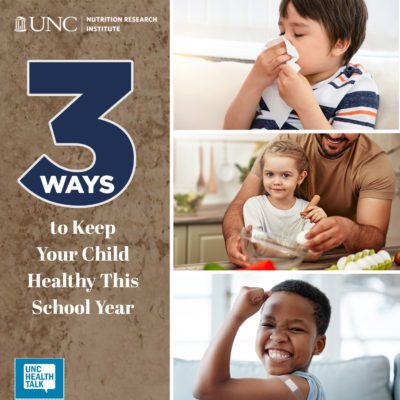Kids get sick—a lot. Sometimes there’s no way to prevent a cold, flu or stomach bug, and you just have to ride it out as a family. But not every virus that circulates at your school has to come home with your kid.
Basic prevention measures can go a long way in preventing sick days.
“You don’t have to feel helpless when it comes to illnesses,” says UNC Health family medicine physician Sarah Ruff, MD. “Being proactive with your child’s health by getting them the appropriate vaccines, ensuring good rest and feeding them a well-balanced diet can go a long way toward staying healthy.”
Dr. Ruff and UNC Health pediatrician Edward Pickens, MD, share three tips for healthier kids all school year long.
1. Remember the basics: wash hands, cover sneezes and keep sick kids home.
The start of a new school year is a good time to remind your children, particularly younger ones, about the simple things we can do to avoid spreading germs. Help your kids remember to wash their hands after the bathroom, before eating and after playing outside. Review how to cover a sneeze or cough (in the crook of their elbow, pointed away from others).
“We need to constantly remind children to wash their hands and teach by example,” Dr. Pickens says.
For older kids and teenagers, remind them not to share drinks or utensils with friends—a single sip from a sick friend’s soda is all it takes to end up sick yourself. (This is especially important if your child has food allergies.)
And as tempting as it can be for busy parents to send an only “slightly sick” kid to school, try your best to avoid doing so.
Whether your child has a cold, the flu or another virus, “the guidelines are the same. Stay home if you have a fever, and don’t send your child back to school until they have been fever-free for at least 24 hours without fever-reducing medications such as acetaminophen and ibuprofen,” Dr. Ruff says.
If your child has a highly contagious illness, such as pinkeye or RSV, be sure to tell his or her teacher so extra steps can be taken to sanitize the classroom.
2. Build a strong foundation with nutritious food and adequate sleep.
Again, getting sick every once in a while is inevitable if you’re human. But the right food and rest can help boost the immune system to ward off germs.
“Eating a colorful plate full of fruits and vegetables and all of the food groups helps to ensure your child is getting all of the nutrients they need to be able to fight off infection,” Dr. Ruff says. “With a well-balanced diet, a multivitamin or extra supplements aren’t necessary.”
Pay special attention to sleep. Children need it to grow, learn and stay well. Elementary school children need nine to 12 hours of sleep each day; teens need eight to 10. Like adults, many children don’t get enough sleep to feel their best.
Parents should help children practice good sleep hygiene, including avoiding screens near bedtime and following a consistent wind-down routine.
“I can’t emphasize enough how important it is to get enough sleep, especially for teens,” Dr. Pickens says. “If anything is going to lower your defenses against infection, it’s fatigue.”
3. Stay up to date on vaccinations.
A new school year is the perfect time to make sure your child has all the required vaccinations for their age, as well as flu and COVID-19 shots for the coming cold and flu season.
Childhood vaccines are critical for keeping individuals and the community safe from serious and, in some cases, deadly diseases. Check with your child’s pediatrician to make sure they’re up to date if you’re not sure.
Flu and COVID-19 shots will be available this fall to all children 6 months and older and are formulated to match the strains of flu and COVID-19 likely to circulate. Flu and COVID-19 shots will not prevent all infections among vaccinated people, but they will help illness be less severe and reduce community spread.
Adults and children can receive the shots back-to-back, at the same appointment. Pediatricians “strongly recommend” children get both, Dr. Pickens says, to protect both kids and vulnerable people they come into contact with, such as infant siblings and grandparents.
Both viruses can cause severe infections but, “even if the illness is relatively mild, missing school and parents missing work can be big problems,” Dr. Pickens says. “The vaccines are both safe and effective, and I would like to see everyone get both of them this fall.”

